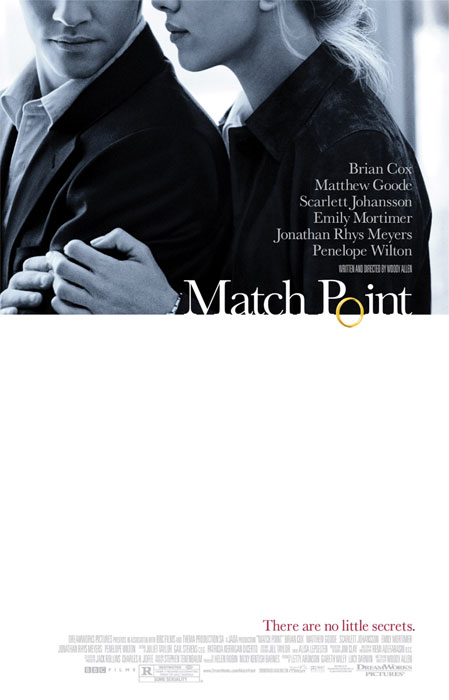
In interviews Woody Allen has often stated he wished his talent for writing and filmmaking had been dramatic rather than comedic. Allen has said comedy comes easy to him and so since 1977's "Annie Hall" he has struggled to make a dramatic film of substance. On a few occasions (1986's "Hannah and Her Sisters," 1989's "Crimes and Misdemeanours" and 1992's "Husbands and Wives") he has, but even these films had comedic undertones. Now after a relative creative dry spell Allen gives us "Match Point," quite possibly his strongest straight drama.
The film is a notable departure for Allen in many respects. New York, the beloved setting for nearly all of Allen’s film has been replaced with London. The “Woody” persona of the nebbish neurotic is nowhere to be seen. There’s not a laugh in the script and like “Crimes and Misdemeanours” before it, the film goes to dark, sordid territory. On the surface, “Match Point” seems nothing like a Woody Allen film and while it is certainly a distant relation to his first film, 1969’s “Take the Money and Run,” fans of the filmmaker are certain to see familiar themes regarding faith, life and morality.
Jonathan Rhys Meyers stars as Chris, a pro tennis player turned tennis teacher who takes full advantage of the offers of upper mobility placed in front of him through Tom (Matthew Goode), a wealthy playboy. Tom’s sister Chloe (Emily Mortimer) becomes quickly smitten with Tom, which leads to marriage and a cushy job at daddy’s firm. The only thing that stands in the way of Chris’ happiness is his lust for Tom’s fiancé Lola (Scarlett Johansson). Their affair leads to complications and Chris decides to take drastic measures.
As is often the case in Allen’s drama there’s a distance and shallowness to the material, that being said, this time Allen seems to be using that flaw to his advantage. Although it should be said there’s a palpable chemistry and sexual tension between Johansson and Meyers the likes of which have never been seen in an Allen film. The movie covers familiar territory regarding class and infidelity, and while Allen develops these elements well, that’s not what makes the film interesting.
The film opens with narration on how people take luck for granted and even though hard work counts, sometimes life comes down to nothing more than luck. The rest of the story works like a proof of that statement as if Allen were to say, “Okay let me give you an example.” In that respect, even when some scenes seem a bit flat and purely functional, the film works quite well.
Allen makes his point with a rather ingenious and unexpected twist. You may not agree with it, but Allen makes a valid and well-supported point by the end of the film. Allen’s thoughts on luck aren’t exactly the stuff of happy endings. For Allen good luck can happen to bad people and bad luck to good people. Not exactly a groundbreaking revelation, but still there’s a cold truth to it that rarely gets put to film and that is refreshing.

No comments:
Post a Comment